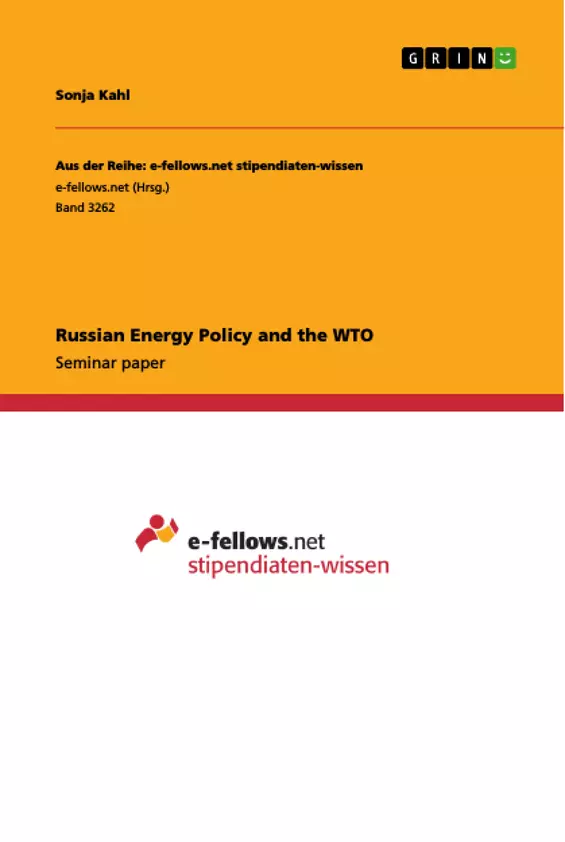The accession of Russia to the WTO has a fairly minor impact on its oil and gas sector. However, it does offer interesting new possibilities. First, it has urged the WTO to review and re-negotiate its regulatory framework concerning trade in energy. Many critics even expect the WTO to conclude a new, separate treaty in the field of energy. Russia as an important exporter could defend her interests and exercise considerable influence in these negotiations. Second, Russia could make good use of the highly efficient Dispute Settlement Mechanism of the WTO. In fact, Russia has already filed or threatened to file complaints against unfair European energy rules or anti-dumping sanctions.
Inhaltsverzeichnis (Table of Contents)
- I. INTRODUCTION
- II. TRADE IN ENERGY AND THE WTO
- 1) “The Cat Is Out of the Bag”
- 2) Not Drafted With Energy in Mind
- 3) Opportunities for Russian Energy Policy
Zielsetzung und Themenschwerpunkte (Objectives and Key Themes)
This paper aims to explore the new opportunities presented by Russia's accession to the WTO for its energy policy. It focuses on how the WTO framework can be used to Russia's advantage, particularly in the context of energy trade.
- The impact of Russia's WTO accession on its energy sector
- The need for the WTO to review its regulatory framework concerning trade in energy
- Russia's potential influence in WTO negotiations on energy trade
- The use of the WTO Dispute Settlement Mechanism (DSS) for resolving energy-related disputes
- The challenges of applying existing WTO rules to energy trade
Zusammenfassung der Kapitel (Chapter Summaries)
- I. INTRODUCTION: This chapter introduces the topic of Russia's accession to the WTO and its limited impact on the Russian energy market. It highlights the public perception of the WTO and introduces the paper's objectives to explore potential new opportunities for Russia's energy policy within the WTO framework.
- II. TRADE IN ENERGY AND THE WTO: This chapter delves into the challenges of applying existing WTO rules to energy trade. It discusses the historical context of energy trade in the GATT/WTO, the shortcomings of the current framework for addressing energy trade, and the potential for Russia to leverage its position as a major energy exporter for influencing WTO rules and resolving disputes through the DSS.
Schlüsselwörter (Keywords)
The main keywords and focus topics of this text are: Russia, WTO, energy trade, energy policy, Dispute Settlement Mechanism (DSS), energy services, trade in energy, GATT, GATS, natural monopolies, state-owned enterprises.
Frequently Asked Questions
How did Russia's accession to the WTO impact its oil and gas sector?
The impact has been fairly minor, but it opened new possibilities for Russia to influence global energy trade regulations and defend its interests within a structured framework.
What role does Russia play in WTO energy trade negotiations?
As a major energy exporter, Russia can exercise considerable influence in reviewing and re-negotiating the WTO's regulatory framework concerning trade in energy.
What is the WTO Dispute Settlement Mechanism (DSS)?
It is a highly efficient system used by WTO members to resolve trade disputes. Russia has used it to challenge unfair European energy rules and anti-dumping sanctions.
Why does the WTO need to review its energy trade framework?
The current WTO rules were not originally drafted with the specific complexities of the energy sector in mind, leading to challenges in applying existing trade rules to energy services.
What are the main keywords associated with this energy policy study?
Key topics include Russia, WTO, energy trade, Dispute Settlement Mechanism, GATT, GATS, and natural monopolies.
- Quote paper
- Sonja Kahl (Author), 2015, Russian Energy Policy and the WTO, Munich, GRIN Verlag, https://www.grin.com/document/502391



